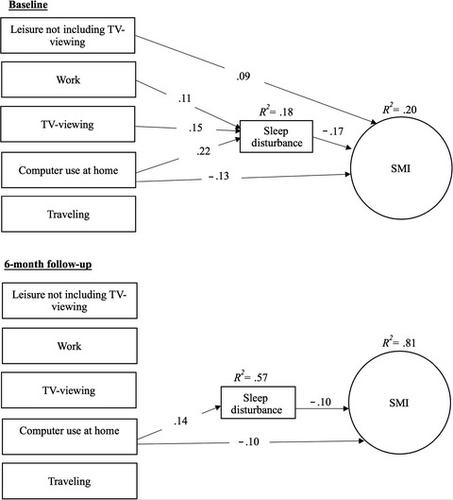当前位置:
X-MOL 学术
›
Cancer Med.
›
论文详情
Our official English website, www.x-mol.net, welcomes your feedback! (Note: you will need to create a separate account there.)
Influence of sitting behaviors on sleep disturbance and memory impairment in breast cancer survivors.
Cancer Medicine ( IF 4 ) Pub Date : 2020-03-23 , DOI: 10.1002/cam4.3008 Diane K Ehlers 1 , Jason Fanning 2 , Alexis Sunderlage 3 , Joan Severson 4 , Arthur F Kramer 5, 6 , Edward McAuley 5
Cancer Medicine ( IF 4 ) Pub Date : 2020-03-23 , DOI: 10.1002/cam4.3008 Diane K Ehlers 1 , Jason Fanning 2 , Alexis Sunderlage 3 , Joan Severson 4 , Arthur F Kramer 5, 6 , Edward McAuley 5
Affiliation

|
BACKGROUND
The purpose was to prospectively examine the effects of sedentary behaviors on subjective memory impairment in breast cancer survivors (BCS) and the extent to which sleep disturbances mediated this pathway.
METHODS
BCS (N = 380; Mage = 57.38 ± 9.25 years) completed questionnaires assessing demographics, health history, sitting behaviors, sleep disturbance, subjective memory impairment, and moderate-to-vigorous physical activity (MVPA) at baseline and 6-month follow-up. A subsample (N = 300) wore an accelerometer to objectively estimate sedentary time and MVPA. Structural equation modeling was used to test direct and indirect effects of self-reported and objectively estimated sedentary behaviors on memory impairment (through sleep disturbance) across time. Models were adjusted for demographic, clinical, and MVPA covariates.
RESULTS
At baseline, more total daily sitting (γ = 0.23), occupational sitting (γ = 0.11), television viewing (γ = 0.15), and computer use (γ = 0.22) were associated with greater sleep disturbance, which was associated with greater memory impairment (γ = -0.22). Indirect effects of self-reported sitting on memory were significant. At follow-up, increased total daily sitting (γ = 0.08) and computer use (γ = 0.14) predicted increased sleep disturbance, which predicted increased memory impairment (γ = -0.09). The indirect path from increased computer use to memory impairment was significant (β = -0.01). In the accelerometer subsample, greater daily sedentary time at baseline was associated with less sleep disturbance (γ = -0.14) and memory impairment (indirect effect: β = 0.03).
CONCLUSIONS
Findings provide early evidence that sedentary contexts may differentially influence sleep disturbance and memory impairment in BCS. Computer use and television viewing may pose the strongest risks to cognitive health. Disparate findings between objective and subjective sedentary measures warrant further research.
中文翻译:

坐姿对乳腺癌幸存者睡眠障碍和记忆障碍的影响。
背景 目的是前瞻性地检查久坐行为对乳腺癌幸存者 (BCS) 主观记忆障碍的影响以及睡眠障碍介导该途径的程度。方法 BCS(N = 380;Mage = 57.38 ± 9.25 岁)在基线和 6 个月后完成了评估人口统计学、健康史、坐姿行为、睡眠障碍、主观记忆障碍和中度至剧烈运动 (MVPA) 的问卷-向上。子样本 (N = 300) 佩戴加速度计以客观估计久坐时间和 MVPA。结构方程模型用于测试自我报告和客观估计的久坐行为对记忆障碍(通过睡眠障碍)跨时间的直接和间接影响。模型针对人口统计学、临床和 MVPA 协变量进行了调整。结果在基线时,更多的每日坐姿 (γ = 0.23)、职业性坐姿 (γ = 0.11)、看电视 (γ = 0.15) 和使用电脑 (γ = 0.22) 与更大的睡眠障碍相关,后者与更严重的睡眠障碍相关。记忆障碍(γ = -0.22)。自我报告的坐姿对记忆的间接影响是显着的。在随访中,每日总坐姿 (γ = 0.08) 和计算机使用 (γ = 0.14) 的增加预测睡眠障碍增加,从而预测记忆障碍增加 (γ = -0.09)。从计算机使用增加到记忆障碍的间接路径是显着的 (β = -0.01)。在加速度计子样本中,基线时较长的每日久坐时间与较少的睡眠障碍(γ = -0.14)和记忆障碍(间接影响:β = 0.03)相关。结论 研究结果提供了早期证据,表明久坐环境可能对 BCS 中的睡眠障碍和记忆障碍产生不同的影响。使用电脑和看电视可能对认知健康构成最大的风险。客观和主观久坐测量之间的不同发现值得进一步研究。
更新日期:2020-03-23
中文翻译:

坐姿对乳腺癌幸存者睡眠障碍和记忆障碍的影响。
背景 目的是前瞻性地检查久坐行为对乳腺癌幸存者 (BCS) 主观记忆障碍的影响以及睡眠障碍介导该途径的程度。方法 BCS(N = 380;Mage = 57.38 ± 9.25 岁)在基线和 6 个月后完成了评估人口统计学、健康史、坐姿行为、睡眠障碍、主观记忆障碍和中度至剧烈运动 (MVPA) 的问卷-向上。子样本 (N = 300) 佩戴加速度计以客观估计久坐时间和 MVPA。结构方程模型用于测试自我报告和客观估计的久坐行为对记忆障碍(通过睡眠障碍)跨时间的直接和间接影响。模型针对人口统计学、临床和 MVPA 协变量进行了调整。结果在基线时,更多的每日坐姿 (γ = 0.23)、职业性坐姿 (γ = 0.11)、看电视 (γ = 0.15) 和使用电脑 (γ = 0.22) 与更大的睡眠障碍相关,后者与更严重的睡眠障碍相关。记忆障碍(γ = -0.22)。自我报告的坐姿对记忆的间接影响是显着的。在随访中,每日总坐姿 (γ = 0.08) 和计算机使用 (γ = 0.14) 的增加预测睡眠障碍增加,从而预测记忆障碍增加 (γ = -0.09)。从计算机使用增加到记忆障碍的间接路径是显着的 (β = -0.01)。在加速度计子样本中,基线时较长的每日久坐时间与较少的睡眠障碍(γ = -0.14)和记忆障碍(间接影响:β = 0.03)相关。结论 研究结果提供了早期证据,表明久坐环境可能对 BCS 中的睡眠障碍和记忆障碍产生不同的影响。使用电脑和看电视可能对认知健康构成最大的风险。客观和主观久坐测量之间的不同发现值得进一步研究。

























 京公网安备 11010802027423号
京公网安备 11010802027423号